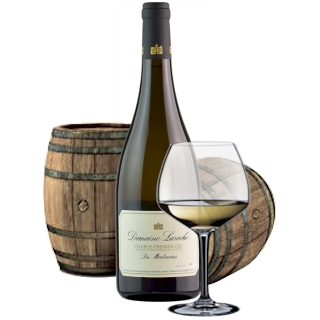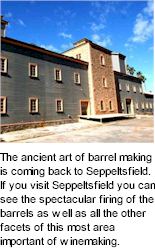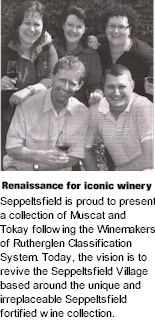


The heart of Seppeltsfield is the unique collection of fortified wines slowly maturing in oak barrels, and dating back in an unbroken line to 1878. Today's Seppeltsfield believe the range to be the most comprehensive of any fortified house in the world, encompassing traditional European fortified styles- principally “port” and “sherry” styles- but with an Australian twist- the grapes used for port style wines are traditionally the same as those which make the great Barossa dry reds- i.e. Shiraz, Grenache and Mataro (Mourvèdre), and a such are quite distinctively different from those made in Portugals’s wonderful Douro Valley.

Seppeltsfield is proud to present a collection of Muscat and Tokay following the Winemakers of Rutherglen Classification System. Today, the vision is to revive the Seppeltsfield Village based around the unique and irreplaceable Seppeltsfield fortified wine collection. All the actions should meet the guiding principle of sympathetic development in harmony with Joseph and Benno Seppelt's original ideas. This means that whatever new activities are undertaken at Seppeltsfield should respect both tradition and environment.
Seppeltsfield comprises nearly 100 hectares of Barossa’s traditional grapes varieties Shiraz and Grenache, with Cabernet Sauvignon ( more recently introduced into these parts) and the traditional European fortified varieties of Touriga (for VP –‘vintage port” style) and Palomino (for the “sherry” styles). Some of the grapes from this vineyard are targeted at the very highest products from the Penfolds stable- Grange, St Henri and RWT Shiraz. A VIP (Vineyard Improvement Programme) is in place to ensure the very highest standard of fruit is produced for the next century or two!
Seppeltsfield Cellar no 8 Rutherglen Muscat utilises ripe fruit and careful oak maturation to create a supple, fruit driven style. The Seppeltsfield Grand Rutherglen Muscat is sourced from premium parcels of extremely ripe fruit and aged in small oak casks to create a wine of incredible richness, complexity and depth of flavour with a long, lingering finish. During the outstanding Rutherglen vintage of 1983 a parcel of fruit with amazing intensity of flavour and reaching an incredible ripeness of 36° Baume was identified and set aside for ageing in small oak casks. The fruit forms the basis of the Seppeltsfield Rare Rutherglen Muscat, a wine with an immensely rich, complex palate and outstanding length; the definitive aged Rutherglen Muscat.

Seppeltsfield Cellar no 6 Rutherglen Tokay is specially blended and carefully aged to create a modern, fruit driven style. Seppeltsfield Grand Rutherglen Tokay is sourced from premium parcels of fruit and aged in small oak casks to produce a wine with luscious toffee honey flavours, rich aged complexity and lingering length. In 1983, Seppelt fortified Winemaker James Godfrey created a special blend from the finest and oldest Tokay barrels, some dating back to 1964, at the Seppelt Rutherglen Winery. This blend was then aged in small oak casks at Seppeltsfield before release as Seppeltsfield Rare Rutherglen Tokay. With a supreme balance of intense fruit flavours, aged complexity and incredible length this wine is the ultimate expression of aged Rutherglen Tokay.
Benno Seppelt designed and built this gravity-fed or gravity-flow winery in the 1890s and it was the main Seppeltsfield winery until the 1980s. Gravity fed wineries require a natural hillside and using gravity assist “minimal intervention” the holy grail for many winemakers. We are gradually recommissioning this wonderful winery, commencing in time for the 2008 vintage. Exclusive hand made reds will come from the old open fermenters, and we will even have some lagars- the traditional Portugese open fermenters designed for foot-treading, still used today for the finest Vintage Ports.
These buildings, dating from the 1850s and on were all purpose built for a very wide range of activities. In some cases we will aim to restore them to former use- in others they will be “adaptively re-used”, of course always respecting their construction and heritage status. Seppeltsfield also houses a modern winery capable of crushing up to 12,000 tonnes of fruit. Most of the wine to be processed here will be for Foster’s, the former owners, and will include both table and fortified wines of high quality.
The main activities undertaken at the Seppeltsfield Winery have historically included the receipt and processing of grapes, juice and wine, along with the storage of wine in tanks and barrels on site. Currently the site is focused on the production of fortified wines. The winery’s crush and pressing equipment was removed in 2005, however the core-infrastructure remains in place and is currently operating or may be recommissioned. Seppeltsfield has a combined tank storage capacity of approximately 5 million litres (excluding spirit and nonoperational storage). These tanks comprise 103 active storage tanks and 30 portable road tankers.
